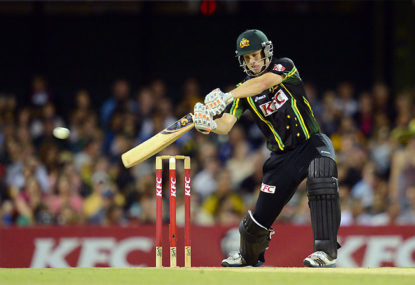World Cup chances up in the air but Smith makes Major call on T20 future, Green dumped despite huge IPL deal
Test great Steve Smith is to play for Washington Freedom in the second season of Major League Cricket as the Australian influence in the…

I generally have to suppress a smirk when the term ‘planning for the future’ is wheeled out in sporting terms.
It does happen on the odd occasion, usually when there is a particularly understanding owner/chairman/selection panel, but in the main it’s an overused phrase that is nothing more than window dressing.
>> Richie Benaud dies aged 84
>> Social media reacts to the passing of Richie Benaud
>> Help The Roar remember Richie by submitting an article
I could, with the bare minimum of research, reel off the names of plenty of football clubs who have had a clearout of players under the pretence of building towards an unnamed target, only for the admission to be canned once results don’t immediately fall into place.
In cricketing terms, England and the World Cup occupy this particularly fraught relationship.
After every calamity, someone somewhere will state that the national side have to have their focus directed towards the next tournament. But as that draws ever closer you can bet your bottom dollar that whatever plans did actually exist will have been unceremoniously chucked overboard as the almighty factor of results rears its head.
This isn’t necessarily a criticism of such an approach as very few professional sporting teams plan, and adhere to, a cohesive, forward-thinking strategy. Or, to be more accurate, allow themselves the time for such a formula, if it has been put in place, to bear fruit or at least show signs of doing such a thing.
This thought came to mind when the Australians announced their touring sides for their excursions to the Caribbean and England later this year.
In many ways the agenda of those who have done the selecting is similar to when the Ashes took place 15 months ago, with the here and now completely overriding all thoughts of what is to come. Hence the inclusion of Adam Voges, Peter Siddle and Fawad Ahmed and the ignoring of more youthful possibilities.
I won’t admit to having a perfect understanding of the Australian sporting psyche, but it isn’t difficult to see why the 17-strong party is as it is. A poor record in recent years in England will have played a part, as will the unwillingness to see the rapid improvement of the past couple of years potentially get knocked back a peg or two.
Winning allows liberties, if they can be seen as that, to be taken and the perception is vastly different when the trend is upward.
The selection of, especially, Adam Voges and Fawad Ahmed would be viewed in less accepting terms if the Australians were in poor form, but the consensus is they’ve been rightly rewarded for excellent domestic campaigns.
Too often a country’s first-class competition, and performances in it, is ignored in favour of hard to determine criteria which can be self-defeating.
A selection panel is ignoring its duties if there is no thought at all of succession planning, but if that detracts from the necessity for games and series to be won then very few benefit in the long run.
From a different, and opposition, perspective, the Australian squad looks strong with most bases covered.
It may well be the final hurrah for a handful of them – Michael Clarke, Peter Siddle, Brad Haddin, Chris Rogers – but that is a hazard of sporting life. It has to be, surely, better to select the best on offer rather than pander to the whims of others?
There is a time and place for the introduction of a younger element, but there is plenty to be gained from a national side that is of the winning variety, just as the fallout from a losing team can be calamitous.
Will Australian followers give a damn if an ageing side return from England in possession of the urn? I know what the answer is, just as those in charge will be well aware that the criticism will be more vociferous than usual if the outcome is in England’s favour.
To embark on a rebuilding phase, as Australia are inevitably going to have to do fairly shortly, will be a lot more palatable from a position of strength rather than the issue being forced.
Pragmatism usurps idealism when those doing the thinking have their heads in the real world and not up in the clouds.